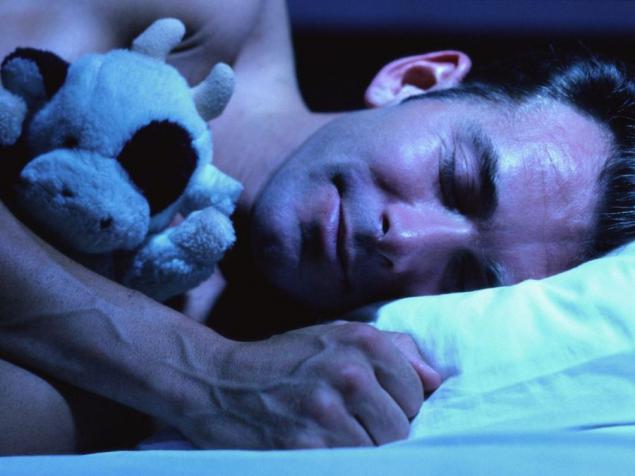824
Myths about sleep
Sleep - it is something from which we depend for our well-being, the state of our body and mood. In this post, we debunk five of the most common misconceptions about sleep:

Myth 1: From an overabundance of sleep we start gaining weight
In fact, the dream - the best diet, which only exists. Studies show that if at night you will sleep only an hour long, you can lose almost a pound a week. According to the study, University of Colorado, people who do not get enough sleep, drink food for six percent more calories than those who slept longer.

Here's why: the level of leptin (a hormone that controls appetite and posylet signal to the brain that your fat stores in order and you have enough energy) falls when you're a little sleep. Maas says that even if you sleep six hours a day (instead of the recommended eight - nine), leptin levels decreased. You wake up hungry and will probably want to eat something high in fat and carbohydrates, to be satisfied. "Thus, the brain deceived, and you eat more than you need," he says.
Myth 2: Lack of sleep can make up for the weekend
Of course, having slept on Sunday to make up for a late night trip to the bed on a Friday or Saturday night - or even an entire week fuss - you feel like a million dollars, but really to recover from the sleep debt is not so easy. You can not make up for lost sleep, whether it be for a week or just one sleepless night, at a time - it may take several days or weeks.

Good practical advice is that you must sleep half the time that you are awake. For example: if you are on your feet for 16 hours, you should sleep eight. But replenishment plays a crucial role. Just as it is impossible to ignore the cost of the loan, because the debt will grow if you ignore your lack of sleep, he does not disappear. You just have to think of it as a bank account sleep.
Myth 3: You can teach an organism limited to less sleep
You know how some people boast the ability to sleep for only a few hours a day because their body is used to it? Do not believe them. You can get used to getting up early, but you can not change your body's need for sleep.

In fact, do fewer sleep - hence cause great damage to their health. Many people believe that five o'clock - that is all that is necessary - but it is a huge mistake. There are individual differences and genetic factors, such as sleep your parents, and so on. Yes, and you can be one of the lucky few who really need only seven hours. But if not, then over time the lack of sleep can affect some aspects of health, such as eg weight or mental activity.
Myth 4: A glass of wine will help deep sleep
While a bit (and many more) of wine can really help to disconnect, just only his head touches the pillow, the dream will not be as useful as if you were completely sober. Drinking any alcohol within three hours or less before bedtime can disrupt REM sleep, so you will never be able to sleep deeply, that's really important. Once you do so once or several times a week, and you will not only worsen sleep deficit, but also opens a direct road to the problems of obesity and memory.

Myth 5: It is important to stay up all night long
Sometimes we have to get up several times a night to have a drink of water, go to the toilet, or when you simply can not sleep, we toss and turn from side to side. The good news is nothing wrong with that. In fact, sleep through the night without a break is not so natural.
Another thing, if after you wake up you will be able to fall asleep again only 10 minutes before lifting. Quality of sleep and memory are affected only when you toss and turn for a long time. So if you can not sleep more than 15 minutes, or you wake up at night for half an hour or longer, which is equivalent to one cycle of REM sleep, this may be a symptom of insomnia.


Myth 1: From an overabundance of sleep we start gaining weight
In fact, the dream - the best diet, which only exists. Studies show that if at night you will sleep only an hour long, you can lose almost a pound a week. According to the study, University of Colorado, people who do not get enough sleep, drink food for six percent more calories than those who slept longer.

Here's why: the level of leptin (a hormone that controls appetite and posylet signal to the brain that your fat stores in order and you have enough energy) falls when you're a little sleep. Maas says that even if you sleep six hours a day (instead of the recommended eight - nine), leptin levels decreased. You wake up hungry and will probably want to eat something high in fat and carbohydrates, to be satisfied. "Thus, the brain deceived, and you eat more than you need," he says.
Myth 2: Lack of sleep can make up for the weekend
Of course, having slept on Sunday to make up for a late night trip to the bed on a Friday or Saturday night - or even an entire week fuss - you feel like a million dollars, but really to recover from the sleep debt is not so easy. You can not make up for lost sleep, whether it be for a week or just one sleepless night, at a time - it may take several days or weeks.

Good practical advice is that you must sleep half the time that you are awake. For example: if you are on your feet for 16 hours, you should sleep eight. But replenishment plays a crucial role. Just as it is impossible to ignore the cost of the loan, because the debt will grow if you ignore your lack of sleep, he does not disappear. You just have to think of it as a bank account sleep.
Myth 3: You can teach an organism limited to less sleep
You know how some people boast the ability to sleep for only a few hours a day because their body is used to it? Do not believe them. You can get used to getting up early, but you can not change your body's need for sleep.

In fact, do fewer sleep - hence cause great damage to their health. Many people believe that five o'clock - that is all that is necessary - but it is a huge mistake. There are individual differences and genetic factors, such as sleep your parents, and so on. Yes, and you can be one of the lucky few who really need only seven hours. But if not, then over time the lack of sleep can affect some aspects of health, such as eg weight or mental activity.
Myth 4: A glass of wine will help deep sleep
While a bit (and many more) of wine can really help to disconnect, just only his head touches the pillow, the dream will not be as useful as if you were completely sober. Drinking any alcohol within three hours or less before bedtime can disrupt REM sleep, so you will never be able to sleep deeply, that's really important. Once you do so once or several times a week, and you will not only worsen sleep deficit, but also opens a direct road to the problems of obesity and memory.

Myth 5: It is important to stay up all night long
Sometimes we have to get up several times a night to have a drink of water, go to the toilet, or when you simply can not sleep, we toss and turn from side to side. The good news is nothing wrong with that. In fact, sleep through the night without a break is not so natural.
Another thing, if after you wake up you will be able to fall asleep again only 10 minutes before lifting. Quality of sleep and memory are affected only when you toss and turn for a long time. So if you can not sleep more than 15 minutes, or you wake up at night for half an hour or longer, which is equivalent to one cycle of REM sleep, this may be a symptom of insomnia.
























